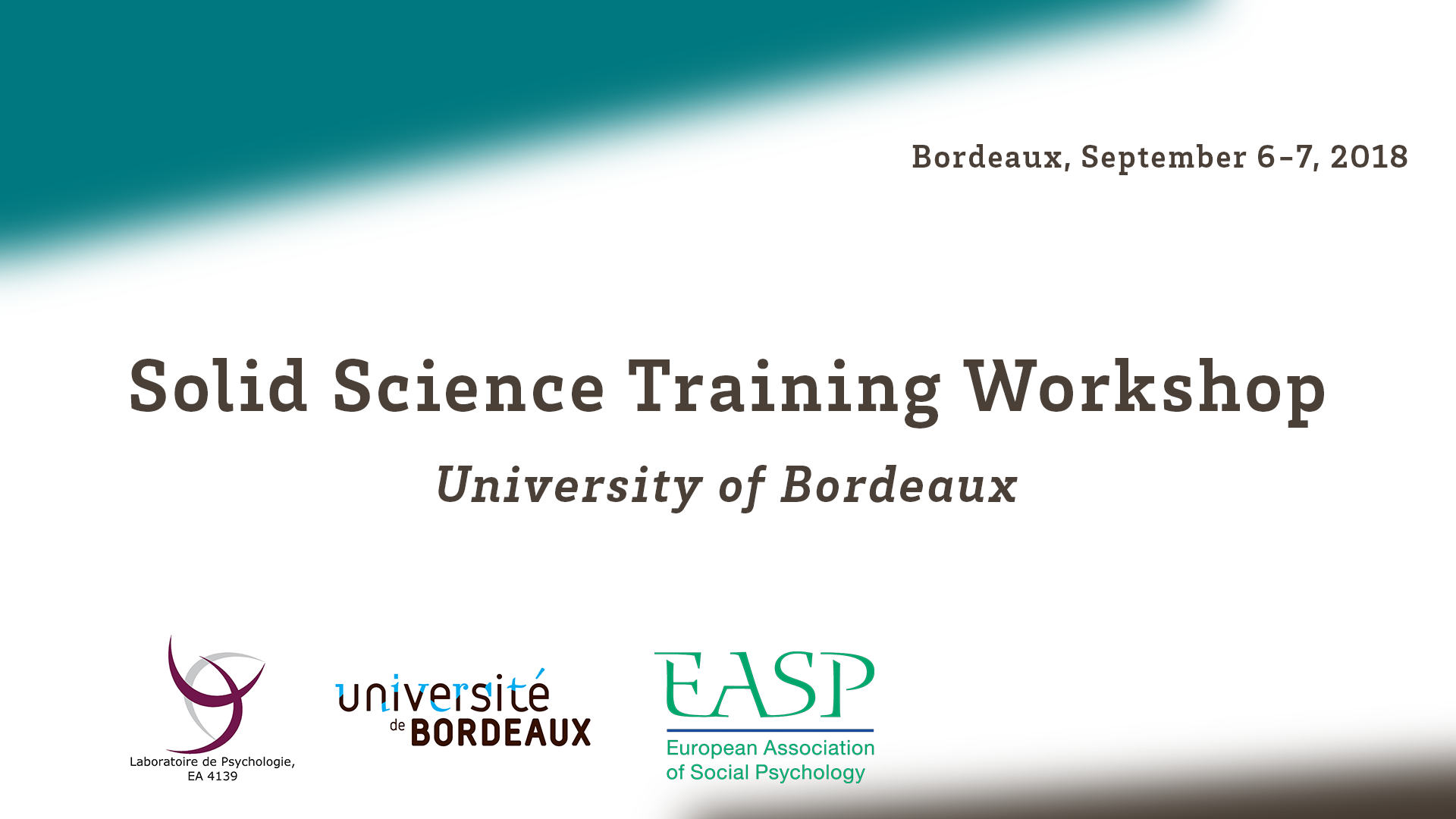Notice
A practical primer to power analysis
- document 1 document 2 document 3
- niveau 1 niveau 2 niveau 3
Descriptif
>> Marco Perugini, University of Milan Bicocca
The conference was given during the RKTS Workshop Solid Science Training organized in Bordeaux (September 6-7, 2018)
Workshop Goal
To provide hands-on trainingin open science. Topics discussed during the workshop include exploratorysocial psychological science (e.g., deep learning), confirmatory socialpsychological science (i.e., pre-registration), and other aspects ofestablishing a reproducible workflow. The workshop is primarily aimed atproviding training to researchers with fewer financial resources.
Content Specifics
The last few years have seensocial psychology in a crisis, ranging from outright fraud (e.g., Stapel) toconsiderable concerns about reproducibility (e.g., Open Science Collaboration,2015). Yet, psychologists have also led the way in the quest to improvereproducibility. Sharing research materials and data, pre-registration, andseparating exploratory from confirmatory data analyses are starting to becomecommonplace. However, the path to more solid science is not easy. This workshoptherefore deals with the challenges that lie ahead. It included active,hands-on sessions to help set up a lab workflow (Frederic Aust), conduct properpower analyses for both simple and complex study designs (Marco Perugini),search for open access software (Michèle Nuijten), integrate these new habitsinto undergraduate teaching (Mark Brandt), conducting exploratory analyses(Rick Klein), as well as confirmatory analyses (Kai Jonas), and initiating orparticipating in crowd-sourced research (Ben Jones).
Changes to the new EU data security laws and how psychologists can prepare forthese changes are discussed. The workshop also had a special focus on how to reduce thecosts of open science for the researchers, while at the same time gatherresources to be able to meet the challenges of the Revolution 2.0 (Spellman,2015).
The workshop was co-organized by the Université de Bordeaux andUniversité Grenoble Alpes and supported by EASP.
Thème
- Interaction sociale (défauts et troubles de la communication, principes psychologiques de la sociologie, psychologie sociale, rapports sociaux, relations interpersonnelles, relations sociales, représentations sociales, réseaux sociaux)
- Psychologie sociale
- Open science
- Exploratory social science
- Research workflows
Dans la même collection
-
Pre-registration in psychological science (and how to fund it)
The conference was given during the RKTS Workshop Solid Science Training organized in Bordeaux (September 6-7, 2018)
- Interaction sociale (défauts et troubles de la communication, principes psychologiques de la sociologie, psychologie sociale, rapports sociaux, relations interpersonnelles, relations sociales, représentations sociales, réseaux sociaux)
- Psychologie sociale
- Open science
- Exploratory social science
- Research workflows
-
A practical primer on transparent research workflows (1/2)
The conference was given during the RKTS Workshop Solid Science Training organized in Bordeaux (September 6-7, 2018)
- Interaction sociale (défauts et troubles de la communication, principes psychologiques de la sociologie, psychologie sociale, rapports sociaux, relations interpersonnelles, relations sociales, représentations sociales, réseaux sociaux)
- Psychologie sociale
- Open science
- Exploratory social science
- Research workflows
-
Exploratory social science : Getting the most out of your data, and an introduction to concepts in …
The conference was given during the RKTS Workshop Solid Science Training organized in Bordeaux (September 6-7, 2018)
- Interaction sociale (défauts et troubles de la communication, principes psychologiques de la sociologie, psychologie sociale, rapports sociaux, relations interpersonnelles, relations sociales, représentations sociales, réseaux sociaux)
- Psychologie sociale
- Open science
- Exploratory social science
- Research workflows
-
Teaching Open Science : Introducing the CREP
The conference was given during the RKTS Workshop Solid Science Training organized in Bordeaux (September 6-7, 2018)
- Interaction sociale (défauts et troubles de la communication, principes psychologiques de la sociologie, psychologie sociale, rapports sociaux, relations interpersonnelles, relations sociales, représentations sociales, réseaux sociaux)
- Psychologie sociale
- Open science
- Exploratory social science
- Research workflows
-
Crowdsourcing psychological science : the Psychological Science Accelerator
The conference was given during the RKTS Workshop Solid Science Training organized in Bordeaux (September 6-7, 2018)
- Interaction sociale (défauts et troubles de la communication, principes psychologiques de la sociologie, psychologie sociale, rapports sociaux, relations interpersonnelles, relations sociales, représentations sociales, réseaux sociaux)
- Psychologie sociale
- Open science
- Exploratory social science
- Research workflows
-
Open source and open science software
The conference was given during the RKTS Workshop Solid Science Training organized in Bordeaux (September 6-7, 2018)
- Interaction sociale (défauts et troubles de la communication, principes psychologiques de la sociologie, psychologie sociale, rapports sociaux, relations interpersonnelles, relations sociales, représentations sociales, réseaux sociaux)
- Psychologie sociale
- Open science
- Exploratory social science
- Research workflows
-
A practical primer on transparent research workflows (2/2)
The conference was given during the RKTS Workshop Solid Science Training organized in Bordeaux (September 6-7, 2018)
- Interaction sociale (défauts et troubles de la communication, principes psychologiques de la sociologie, psychologie sociale, rapports sociaux, relations interpersonnelles, relations sociales, représentations sociales, réseaux sociaux)
- Psychologie sociale
- Open science
- Exploratory social science
- Research workflows








